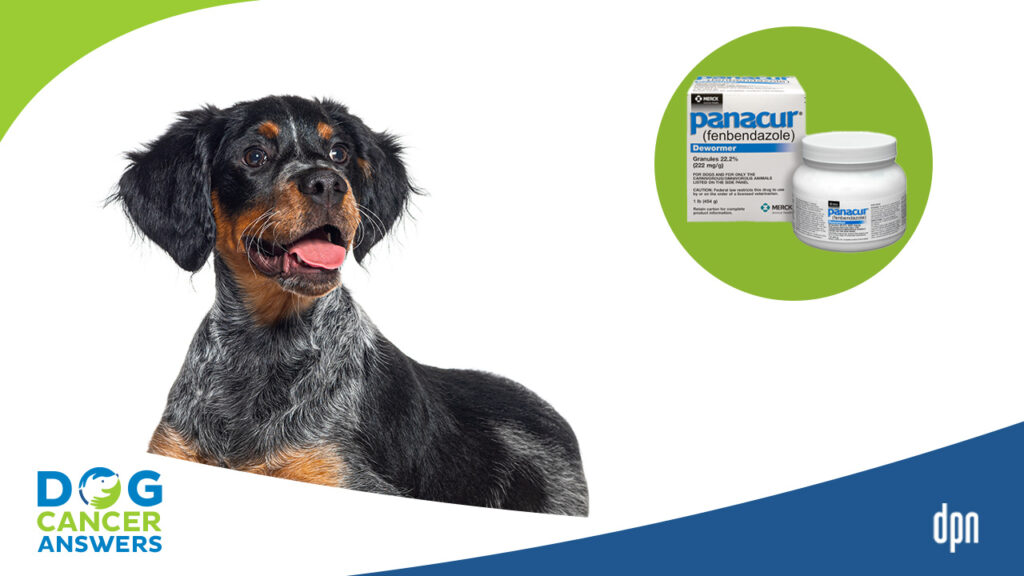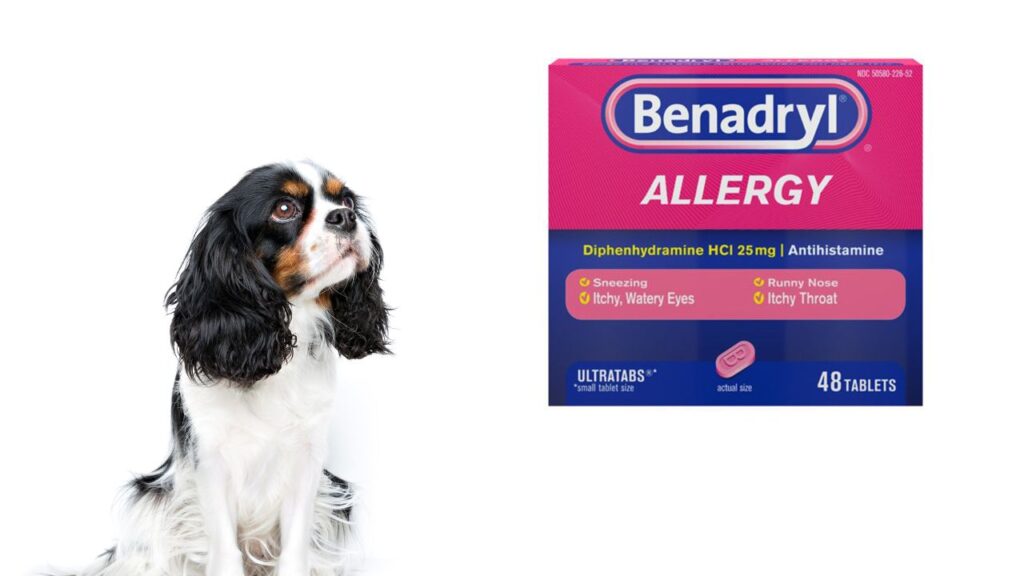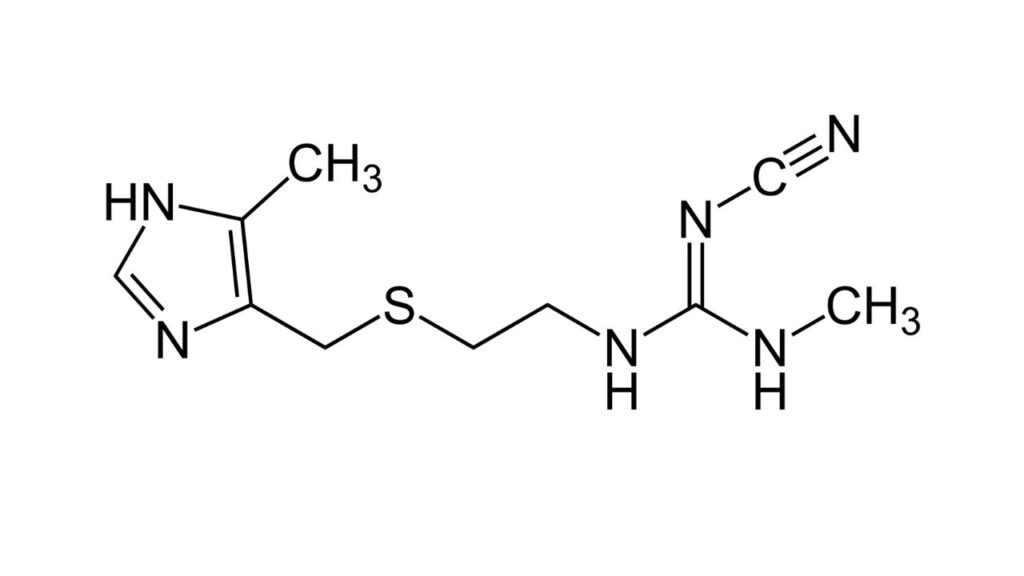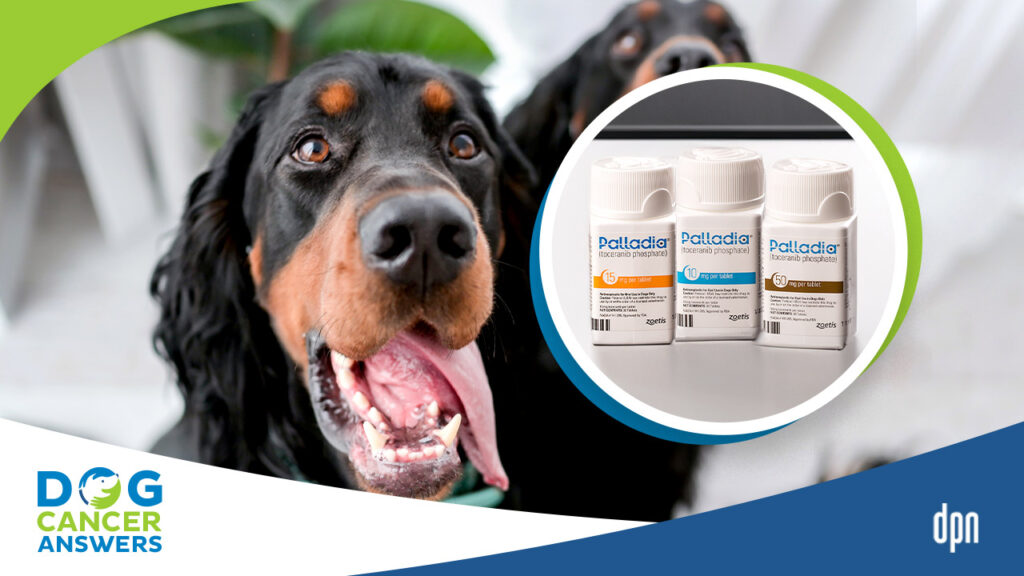EPISODE 130 | RELEASED September 20, 2021
Tagamet and Benadryl for Dogs | Nancy Reese, DVM, MPVM, PhD Deep Dive
Do the over-the-counter medications Tagamet and Benadryl cure cancer in dogs, or just reduce its symptoms? Dr. Nancy Reese explains how these drugs work, and the role they can play in helping your dog fight cancer.
SHOW NOTES
We’ve been helping folks fight dog cancer since 2008, and over the years we’ve seen dozens of fads come and go. There’s always a new “cure” being touted. The ones that actually DO help tend to stick around.
So here we are in 2021, and the latest internet sensational promise we see is a “protocol” that uses Benadryl and Tagamet to “cure” dog cancers. All dog cancers, is the story.
Is that a true story, or a hopeful wish?
Dr. Nancy Reese, our chief medical editor and resident epidemiologist/veterinarian, turns her big brain to the topic to help us understand why people hope these over-the-counter drugs can help their dogs … and how they actually can support our efforts.
Diphenhydramine (brand name Benadryl) and cimetidine (brand name Tagamet) are both antihistamines that work to block histamine receptors on cells. They have their place, in certain cancers. Listen in to find out the why and the how.
[00:00:00] >> James Jacobson: Today’s show is brought to you by the bestselling book The Dog Cancer Survival Guide: Full Spectrum Treatments to Optimize Your Dog’s Life Quality and Longevity. It’s available everywhere books are sold in both paperback and digital editions and on the publisher’s website at DogCancerBook.com. Use coupon code PODCAST on that website to get 10% off the Dog Cancer Survival Guide today.
[00:00:30] >> Dr. Nancy Reese: And that’s where I think the biggest danger is: that people are going to not do proven effective therapies because they want to do this. So if you’re doing this at the expense of doing a treatment that we have better evidence for, then we’re doing a disservice.
[00:00:47] >> Announcer: Welcome to Dog Cancer Answers, where we help you help your dog with cancer.
Here’s your host, James Jacobson.
[00:00:55] >> James Jacobson: Hello friend, and thank you for joining us today. Today we are tackling the topic of an internet sensation: the over-the-counter drugs Tagamet and Benadryl used as a cure for cancer. Cure. Well, unfortunately, while this claim gets lots of buzz, it is a little more complicated than that.
And here to explain the realities of Tagamet and Benadryl as part of a cancer treatment plan is Dr. Nancy Reese, a veterinarian with a Master’s Degree in Preventative Veterinary Medicine and a PhD in Epidemiology. Dr. Nancy is also our chief medical editor here at Dog Podcast Network. Dr. Nancy, thank you once again for joining us on Dog Cancer Answers.
[00:01:44] >> Dr. Nancy Reese: It’s a pleasure to be here.
[00:01:45] >> James Jacobson: Today we are going to tackle a subject that we have been debating whether or not we should give air time to. And that is this discussion about using Tagamet and Benadryl – human Tagamet, which is an over-the-counter drug and Benadryl – as a protocol for dog cancer. And if you’re listening to this and wondering, "Why would that have anything to do with dog cancer?" well, you’re not the only ones. However, there is discussion on the internet about this, and some people swear by it and say it shrinks tumors and causes remission, and basically cures cancer with like 99% success rate. So as someone who probably has listened to a little bit of Dog Cancer Answers, you know that probably isn’t exactly so. But there seems to be some interest in this plus there seemed to be a lot of anecdotal people saying, hey, this is doing something. So that’s why we wanted to talk to Dr. Nancy today and ask you about it. What’s the scoop on this whole Tagamet Benadryl protocol?
[00:02:53] >> Dr. Nancy Reese: So there certainly does seem to be a lot of internet interest or social media interest in it.
But as you kind of lead into, anything that claims a 99% success rate probably is too good to be true.
[00:03:08] >> James Jacobson: My French fries at McDonald’s will not be 99%, whatever. I mean yeah. Even things that are super consistent. Although, I don’t know, french fries, but yeah, it’s like, there’s very few things in life that are 99%. Especially in medicine.
[00:03:20] >> Dr. Nancy Reese: And truly, if that were the case, then we wouldn’t be seeing the kind of cancer we are because everybody would be on board. There is not a single vet that wants your animal to keep having cancer because they make more money. That is just such a fallacy out there. If there was something that was easy, like Tagamet and Benadryl, that would cure cancer, I would buy stock in Benadryl and Tagamet.
[00:03:45] >> James Jacobson: I think the companies that make those would be very happy to be having you buy stock because clearly they built a better mouse trap that not only helps your allergies, but curious cancer.
[00:03:55] >> Dr. Nancy Reese: Right, right. It does sound too good to be true.
[00:03:58] >> James Jacobson: So is there anything, is there any there, there?
[00:04:01] >> Dr. Nancy Reese: Well, there are certainly some indications for, more so for Tagamet than Benadryl, there are certain factors or features of Tagamet, or cimetidine is the drug name, in particular that actually does seem to have a little bit of anti-cancer effects. And I believe that Dr. Dressler talks about that in his books as well, that Tagamet in particular has some features that makes cancer cells respond to it. One of the ways that these – both drugs, really – can sort of affect cancer is that some cancers are fueled more by histamine.
So histamine might make the cancer grow a little bit more, and not all cancers probably have that, but histamine might be one of the growth factors that stimulates growth of some cancers.
[00:04:52] >> James Jacobson: Which types of cancers are more susceptible to that?
[00:04:56] >> Dr. Nancy Reese: Well, it seems like in humans, colorectal cancer, and maybe some stomach cancers seem to be particularly responsive to that Tagamet effect, and I believe it’s included in the standard of care for treating those types of cancer.
[00:05:11] >> James Jacobson: Okay.
[00:05:12] >> Dr. Nancy Reese: So those ones are, are big ones. In dogs, probably our most well-known histamine-related cancer is mast cell tumors. And humans don’t really get mast cell tumors the way dogs do, or not in the same frequency. So we have a kind of a different cancer in the dog world in a way than humans do. And Benadryl and Tagamet certainly provide some benefit for mast cell tumors, not in terms of curing them, but in decreasing the effects of the histamine that mast cells are so full of.
[00:05:46] >> James Jacobson: Okay. And then for listeners who don’t know what mast cell cancer is, what is it?
[00:05:51] >> Dr. Nancy Reese: So mast cells are a normal type of blood cell that the bone marrow makes, but when they form tumors, they get an abnormal collection of these mast cells, most commonly either on the skin or underneath the skin, but they can also affect the liver and the spleen and other areas.
And these mast cells, they’re very rapidly-growing types of tumors, and the mast cells themselves are full of little granules that contain histamine. So when a mast cell releases that histamine, we will see dramatic changes. They’ll get really red, or inflamed and things, ’cause histamine is a very potent inflammatory agent.
So mast cell tumors often are raised, red, easily damaged, easily bruised type of tumors if they’re hit or trauma happens to them. And that they have different grades of mast cell tumors and grade ones are usually fairly benign and can be removed surgically and not necessarily come back. And then there’s another grade that they can be much worse and spread to internal organs and make the animal feel really sick.
So there’s different levels of mast cell tumors.
[00:07:03] >> James Jacobson: Okay. For people who are at home writing notes, it’s mast, M-A-S-T. So let’s talk a little bit about using this cimetidine with these types of cancers. Why might it be helpful and why does Dr. Dressler recommend it?
[00:07:17] >> Dr. Nancy Reese: So certainly it seems to control the histamine reaction.
So if – oftentimes before surgery, and maybe even a little after surgery for removing a mast cell tumor, having those anti-histamines on board will make the tumor less likely to cause a bunch of inflammation either with the surgical manipulation or beforehand. If it’s on a place where the animal is actively able to chew at it or anything else, having an antihistamine will decrease the local reaction. They can even sometimes seem to shrink the tumors a little bit because the cells are so often releasing this histamine that they seem to get bigger and smaller with time. And the anti-histamines ahead of time can kind of shrink it to a more solid or basic level, if that makes sense.
[00:08:05] >> James Jacobson: It does. So Benadryl is a brand name associated with, I don’t know, the maker of Benadryl, the company that makes it, probably some big pharmaceutical company.
[00:08:14] >> Dr. Nancy Reese: Yes.
[00:08:14] >> James Jacobson: When it comes to using this – and we’re not going to call it a protocol – when it comes to using this with dogs with mast cell, do brand names matter? Are they important?
[00:08:25] >> Dr. Nancy Reese: In my opinion, no. I think Tagamet, which is cimetidine as the drug, Benadryl, which is diphenhydramine as the drug – generics in every other circumstance work just as well. So I don’t see any benefit to the brand names.
[00:08:40] >> James Jacobson: So Benadryl has one class of drugs and then Tagamet, which is the cimetidine, is a different, but they’re very similar, and for this purpose, they’re ostensibly the same?
[00:08:51] >> Dr. Nancy Reese: They’re slightly different in that histamine can effect multiple receptors on cells. So there are different types of histamine receptors, I think we’re up to at least four. So they’re either called an H1, an H2, an H3, an H4, and I think there’s some subsets there.
Benadryl is an H1 blocker and Tagamet is an H2 blocker. So there you’re, by giving both of those, you’re effectively blocking two different areas that the histamine might attach to in effect.
[00:09:24] >> James Jacobson: Okay. So other than mast cell, would you ever consider or recommend someone use this for treating dog cancer?
[00:09:33] >> Dr. Nancy Reese: I think the one other that I might consider it, ha, is in melanomas.
Partly, we don’t have very many good options for melanoma, especially if surgery is not practical or possible, but there seems to be a little bit of evidence that Tagamet in particular could affect melanoma cells. So I might consider it in that case, again, especially since we don’t have other things available.
[00:09:59] >> James Jacobson: Okay. So you’ve read this on the internet, you’ve heard this podcast, you understand that there may be two types of cancers that can benefit from it, and you want to talk to your veterinarian about it. Walk us through that process because they probably are not going to go, oh, well yes of course.
[00:10:17] >> Dr. Nancy Reese: Right. And I think if somebody has a mast cell tumor, most vets would be pretty okay with adding the cimetidine and/or Benadryl as a feature.
One of the things I don’t like about the description of this "protocol" is-
[00:10:36] >> James Jacobson: In quotes.
[00:10:36] >> Dr. Nancy Reese: …that – yes, in quotes – is that I think there’s a statement somewhere along the way that, "Don’t use other treatments, it won’t work if you do traditional therapies and things." And that’s where I think the biggest danger is, that people are going to not do proven effective therapies because they want to do this.
So if you’re doing this at the expense of doing a treatment that we have better evidence for, then we’re doing a disservice.
[00:11:03] >> James Jacobson: We will be right back after this quick break with more from Dr. Nancy on what makes good science and how you can tell if something is for real or not.
We are back with Dr. Nancy Reese. Now, Dr. Nancy, as someone who, you know, has spent a good deal of your life doing research and, maybe PhD level research, when you come across this and it’s gaining traction, how does that make you feel?
[00:11:36] >> Dr. Nancy Reese: It’s really sometimes frustrating to try to come up against this, because like I said at the beginning, I honestly would love it if this worked for all cancers and could do 99%. I mean, it would just be the greatest thing if I could tell people when I have horrible news for them, that, Hey, I’ve got this very cheap, very low side effect, and this is going to cure your dog, or 99% chance. I would absolutely love that. But the first thing I do is look, well, what’s the rationale behind this.
And while some of these drugs – both of these – in test tubes have some effect in certain pathways, as a whole treatment for cancer, which is just such a nasty disease, we need to find real proof that it works and it’s just not out there. Comparing to something like artemisinin, when I look for clinical trials that are looking at Tagamet and/or Benadryl as part of the protocol, there’s a huge number of studies that have those, but every one of them is to mitigate side effects of chemo, not anything to do with looking at those agents as primary anti-cancer drugs.
[00:12:43] >> James Jacobson: So how do you teach scientific literacy? How do you advise someone who, you know – "Oh my gosh, look, there’s this thing that my vet doesn’t want to talk about because it’s cheap and I can go to the CVS and pick it up and I just need to do this!" – how do you advise someone to think, and to scrutinize that in such a way that they would be doing their dog a service versus a disservice.
[00:13:08] >> Dr. Nancy Reese: I think the first thing is to have a good enough relationship with your veterinarian that first you could even discuss it without them just brushing you off or saying, "No."
I think if you get to know your veterinarian, you will find, like I said, that none of them want to steer you to a horrible, more expensive treatment because they can benefit from it. It’s really because there’s no evidence that something cheap and lovely like that, that it actually works. So if you can have an honest heart-to-heart with your veterinarian of saying, you know, this is why I want to try it, the veterinarian will say, usually, try to have some evidence for other things working better, or at least be able to say, look, it’s not that I don’t want you to do this, it’s that I don’t believe it’s going to work. And you’re delaying doing other things in the hope that this will work.
[00:14:00] >> James Jacobson: And I think you’ve looked a little bit at the website where this is promoted and you’ve seen all these, quote, "success stories".
What do you make of that?
[00:14:09] >> Dr. Nancy Reese: That’s always a hard one because I will admit that sometimes we find some great new treatment or things that first start out with anecdotal stories. So there’s some interest in saying, gee, I wonder what was going on with these. One of the biggest worries that I have, or red flags, I guess, is that unfortunately, anything on social media, you have to take with such a huge grain of salt. Even on a day-to-day basis in the office I will have people come in and they’ll discuss, say, maybe what their last vet had said, and what treatments they did, and what the effect was. And when I get the medical records, looking at that, I find the reality might be very different from the person’s perception. So sometimes for protocols like this, somebody might say, gee, that looks like it could be a mast cell tumor.
And that person goes home and tries Tagamet and Benadryl and turns out it was an insect bite. So you might get these wonderful stories of "the tumor went away" when it actually wasn’t diagnosed as that particular type of tumor. So anything that reports just on anecdotal information is just really hard to accept.
[00:15:27] >> James Jacobson: Without getting too like, meta, but it seems like everyone can be a scientist today on the internet.
[00:15:36] >> Dr. Nancy Reese: Right. Absolutely.
And whether they’re good scientists or bad scientists, you can do both on internet.
[00:15:42] >> James Jacobson: You can find any information you want and someone will talk about it as, as if they are an authority.
[00:15:48] >> Dr. Nancy Reese: Absolutely. And I have as a sort of a form of practice, I guess you might call it, I have tried to think of something kind of bizarre, or some effect that I wanted to study, and I have let my personal biases lead me down on direction.
So if I want product X to work for this skin condition, I might look on the internet and find 10 sources that support what I want to do, and ten that say no, and I start discarding all the ones that say no, and just go with those 10 that said yes, because I believe that I want it to work and I want to have some justification for what I’m giving.
So you can pretty much find evidence to defend any product that you want to use. And that’s not necessarily good science.
[00:16:34] >> James Jacobson: And that’s not good science. It’s sort of the opposite of what the scientific method is. I’ve never asked anyone this question, but how would you basically distill it to, you know, an elementary school kid, what is good science?
[00:16:47] >> Dr. Nancy Reese: That’s a, that’s a fascinating question, really. Because to describe it to a school-aged child, I guess I would say, you have to take information that is consistently applied and have a consistent outcome. So you take situations that are fairly equal and apply a treatment and get good responses. A lot of the studies on some of these alternative things, they might sound really good from the summary, but when you look at it, you find out the animals were not comparable, the diseases were not comparable, the treatment was not comparable. So you can’t really come up with a conclusion that the drug or whatever it is worked when you used it against such a wide variety of things. So good science is consistency and repeatability of effect.
[00:17:42] >> James Jacobson: That’s what I remember! The hypothesis, and then you determine something, and then can you repeat it?
[00:17:47] >> Dr. Nancy Reese: Repeating is very big.
[00:17:48] >> James Jacobson: And you have to be able to repeat it in different conditions, and other people have to be able to repeat it with the same results. And then you’re like-
[00:17:55] >> Dr. Nancy Reese: Good point.
[00:17:56] >> James Jacobson: And that I think is one of the rigors that has been lost on the internet "scientists" who, who discover amazing "protocols" and use all the power of the internet to persuade someone that it might be right when it’s an extraordinary claim.
[00:18:14] >> Dr. Nancy Reese: Absolutely. And that, one thing I’ve learned over the years of, when you look at something that’s on the internet, even an article about something where you were actually personally involved, and then you read the article and you think, that isn’t the way it happened at all, or these factors are not at all – you know? So I think there’s a big factor of that in the internet.
[00:18:35] >> James Jacobson: Yeah. I think that happens a lot is, you know, it’s like that if a reporter ever covers something, every interview has at least one or two things in it that there, was not exactly what she meant, but that’s what got published. And so that’s how, you know, the giant fish story, uh, grows and it’s like, it was this big, it was this big, it was THIS BIG.
And this other thing of just, like, extraordinary claims require extraordinary proof.
[00:19:03] >> Dr. Nancy Reese: Right.
[00:19:03] >> James Jacobson: I think that should be a trigger when something sounds too good to be true, well, maybe it is. And it’s worth thinking about and looking at, and considering that maybe what you’re hearing is not the truth. Discernment is so critical, and it’s easy, obviously, when you have a dog with cancer to, to throw out discernment for hope.
[00:19:27] >> Dr. Nancy Reese: Absolutely.
[00:19:27] >> James Jacobson: When in fact there are a whole profession of people in the veterinary field, whether they are, you know, oncologists who like to use chemotherapy drugs, or Eastern medicine practitioners who use herbs and energy, you know, there’s a whole bunch of things, but these are folks who have dedicated their lives to studying this.
And it’s important to use your own discernment to make sure that you’re not just falling prey for something that is too good to be true.
[00:19:57] >> Dr. Nancy Reese: Right. Hope is a good thing, but it has to be realistic hope as well.
[00:20:01] >> James Jacobson: Well, Dr. Nancy, thank you so much for doing this show with us today. We debated about it for a long time, because it just is one of those things that just like, do we put more attention on it by discussing it?
But I think hopefully this was helpful for our listeners. Thank you so much for being a part of it.
[00:20:21] >> Dr. Nancy Reese: Thank you.
[00:20:24] >> James Jacobson: And thank you listener for joining us today. Yes, magic bullets. They can be so tempting, and we want to believe in them so badly, but it’s important to evaluate any possible treatment for whether it truly is effective and has good science to back it up.
Check out the show notes on your podcast app or on our website at DogCancerAnswers.com for anything that you might’ve missed here. And don’t forget to subscribe to our newsletter, which is Dog Cancer News, and you can subscribe at DogCancerNews.com. If you have a dog with cancer and you need some support as you sort through the different treatment options to figure out what is the best choice for your dog, you might find the comfort and advice that you’re looking for in our private Facebook group.
And you can find that on Facebook by searching for Dog Cancer Support, or you can go to the quick URL DogCancerSupport.com and join our community there. Please, let other people know about this show! If you found this helpful, please share in the social media and tell your veterinarian and your veterinarian’s team – the vet techs and everyone else who’s there – about Dog Cancer Answers. It helps us grow and it helps other dog lovers. Well that is it for today’s show. From all of us here at Dog Podcast Network, I’m James Jacobson, and I want to wish you and your dog a very warm, Aloha.
[00:22:00] >> Announcer: Thank you for listening to Dog Cancer Answers. If you’d like to connect, please visit our website at DogCancerAnswers.com or call our Listener Line at (808) 868-3200. And here’s a friendly reminder that you probably already know: This podcast is provided for informational and educational purposes only. It’s not meant to take the place of the advice you receive from your dog’s veterinarian.
Only veterinarians who examine your dog can give you veterinary advice or diagnose your dog’s medical condition. Your reliance on the information you hear on this podcast is solely at your own risk. If your dog has a specific health problem, contact your veterinarian. Also, please keep in mind that veterinary information can change rapidly.
Therefore, some information may be out of date. Dog Cancer Answers is a presentation of Maui Media in association with Dog Podcast Network.
Hosted By
SUBSCRIBE ON YOUR FAVORITE PLATFORM
Topics
Editor's Picks
CATEGORY










